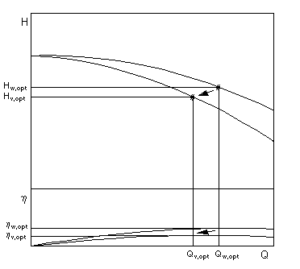Task of Pumps
In a narrower sense, in contrast to blowers and compressors for gases and compressible media, pumps for incompressible media are referred to as liquid pumps. This means that the volume of the fluid remains approximately constant as the pressure increases. In practice, this also includes liquid mixtures with a low solid or gas content.
In the case of liquid transport, the pressure of the pump is required to overcome the flow resistance that arises in the pipe system, e.g. for the circulation in a heating system.
In addition, in cases of different liquid levels, overcoming the difference in height (Hgeo) is required, e.g. fluid displacement to a higher level ie. to fill and maintain a near constant level in an overhead tank.



